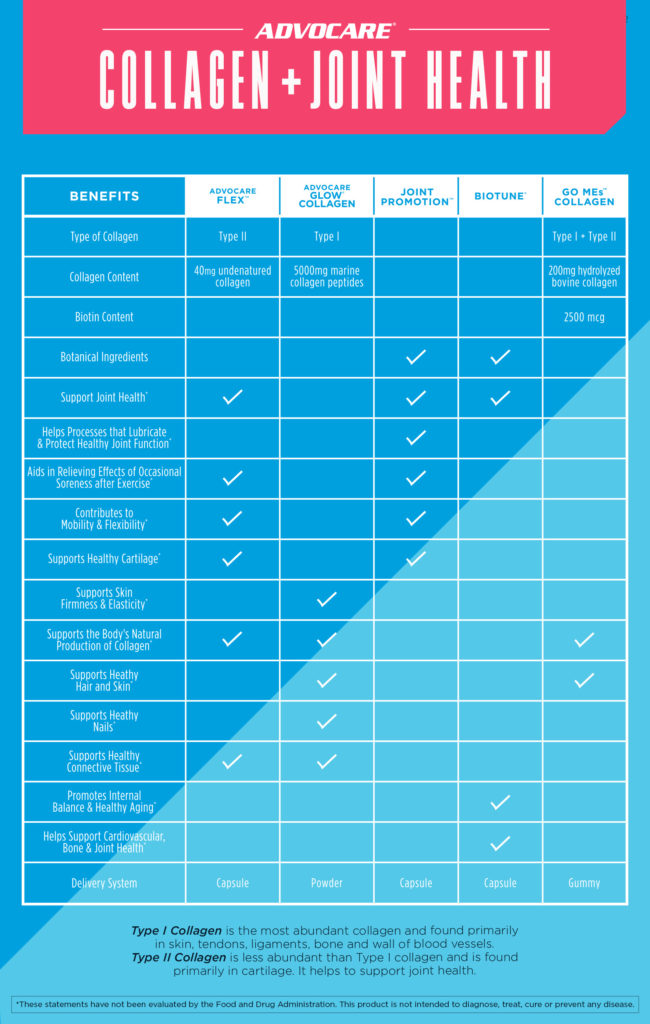
Collagen is all the craze these days, but it can be hard to differentiate what is real and what is less than factual. When people talk about collagen and its benefits it is usually in reference to health and beauty, but collagen can serve several purposes. And although collagen is not the fountain of youth, choosing types of collagen that are right for you can help support your health needs and goals.
You may also like: The ABC’s of Supplementing Your Skin, Part 3: C is for Collagen
Your body makes collagen by combining amino acids which it obtains by breaking down the protein-rich foods you eat like chicken, fish, dairy products, beans and eggs. Collagen synthesis requires vitamin C, zinc and copper which means you also need to eat foods containing these essential nutrients as well. Eating a balanced diet containing all of the nutrients you need can be a daunting task, which is why many people turn to supplements as a way to help fill in some of those nutritional gaps.
What are your collagen needs?
Skin Health. As humans age, collagen production begins to slow down. Studies have shown that collagen peptides or supplements containing collagen may help to slow the aging process if taken consistently over a long period of time.* (1, 2) If skin is the primary focus, it is important to look for a collagen supplement that is high in type I collagen, the most abundant collagen in the body which helps to provide structure to skin, connective tissue, cartilage and bone.* The source of collagen is also important. Most collagen is sourced from bovine (cow) or porcine (pig), however marine collagen (collagen sourced from marine animals) is becoming more popular and has been shown to be more bioavailable than some traditional sources.
Bone and Joint Health. Collagen can also help support healthy bones and joints.* As the amount of collagen decreases in the body, the first place you see it is in your skin elasticity, but collagen also plays an important role in supporting our joints.* A joint is a point in the body where two bones make contact, and each bone that meets at these joints has a layer of cartilage, which is primarily made up of type II collagen. Studies have shown that consuming Type II Collagen consistently helps to support joint and bone health.*
Cardiovascular Health. type III collagen can help support a healthy vasculature in conjunction with a healthy diet and exercise.* Connective tissue provides structure and protection for arteries, which are responsible for carrying blood from the heart to the rest of the body.* The connective tissue in arteries is made up of collagen and elastin fibers. Studies have shown that type III collagen is essential for normal collagen type I production in the cardiovascular system and other organs.* To get the most out of your collagen supplementation, you can take type I and III collagen together to help support cardiovascular health.*
* These statements have not been evaluated by the Food and Drug Administration. This product is not intended to diagnose, treat, cure or prevent any disease.
Which products are right for you?
AdvoCare® has products geared towards various collagen and joint health needs. Determining your goals and then, using the features and benefits chart below, deciding which you’re most likely to take consistently is a great way to decide what’s best for you.
For more information on the below AdvoCare products please visit their product pages: AdvoCare Glow® Collagen, AdvoCare® Flex™, Joint ProMotion™, BioTune® and Go MEs™ Collagen.

How will you add more collagen to your diet to help support your needs and goals?
This article is for educational purposes only. Substantiated claims for AdvoCare products are contained on the label and product pages for our products. Taking dietary supplements may support overall health. AdvoCare recommends that you consult your healthcare professional before starting an AdvoCare product regimen.
- Bolke, L., Schlippe, G., Gerß, J., & Voss, W. (2019). A Collagen Supplement Improves Skin Hydration, Elasticity, Roughness, and Density: Results of a Randomized, Placebo-Controlled, Blind Study. Nutrients, 11(10), 2494. https://doi.org/10.3390/nu11102494
- Borumand, M., & Sibilla, S. (2014). Daily consumption of the collagen supplement Pure Gold Collagen® reduces visible signs of aging. Clinical interventions in aging, 9, 1747–1758. https://doi.org/10.2147/CIA.S65939

Lauren Horton, PhD.
Dr. Lauren Horton is passionate about moving patient care forward through research. As a Division Research Director, she is at the forefront of groundbreaking studies and innovation. Her dedication to advancing knowledge and solving complex problems has led to her pivotal role in shaping the future of patient care in the healthcare industry.
Dr. Horton leverages her deep insights and knack for communicating complex ideas in an accessible way to educate and engage a global audience. In her spare time, she is an avid advocate for health and wellness, dedicated to making a positive impact on the world. She believes that knowledge is a powerful tool for change and strives to empower others with the information and inspiration needed to effect meaningful transformation.
Dr. Horton loves to help improve the quality of life of those around her. She has helped men and women from all over the country discover how small steps each day can lead to huge strides towards living a healthier lifestyle.
Dr. Horton holds a BS in biology from Rust College, a MS in health economics and outcomes research from Xavier University and a PhD in biomedical science from Morehouse School of Medicine and completed her post-doctoral studies at the University of Pennsylvania.




